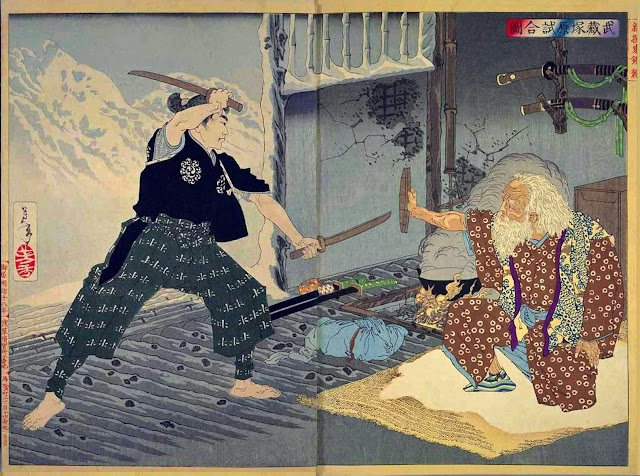(Miyamoto Musashi fighting Tsukahara Bokuden, painted by
Yoshitoshi (1839–1892), [Public Domain]
via Creative Commons)
Around 1584 CE, a boy was
born into the Hirata family of samurai in the village of Miyamoto, located in
the Harima Province of Japan. The boy’s father, Miyamoto Munisai (or Shinmen
Munisai), was considered to be one of Japan’s greatest swordsmen, and he ran
the village’s local dojo. With such a skilled parent, many would have expected that
the boy would grow to be skilled with a sword. Yet, few could have predicted
the unprecedented martial prowess that the newborn child would soon show the
world. The boy’s name was Miyamoto Musashi, and he would later claim to have
fought in over sixty duels, many of which ended in the death of his opponents.
Although Musashi is best
remembered for being the undefeated “Alexander the Great” of dueling, he was
also a bit of a renaissance man. Besides being a duelist, he joined the
military and fought in around six battles. He also was an artist who painted,
sculpted and carved. As another occupation, he became a foreman or supervisor
and worked in construction. Yet, his greatest contribution to his legacy was
his writing career.
When he was around twenty-two
(perhaps, 1606 CE) he produced his Writings
of the Sword Technique of the Enmei Ryu (Enmei Ryu Kenpo Sho), which was his first known written work on
swordsmanship. In addition to this, near the end of his life, he also wrote the
Thirty-five Instructions on Strategy
(Hyoho Sanju Go). All his earlier
writing, however, were surpassed by the book he wrote in the years preceding
his death in 1645—The Book of Five Rings,
or Go Rin no Sho.
Nevertheless, Musashi’s
careers in literature and construction are not why most readers are here,
reading this article. No, the most interesting and dramatic events in Miyamoto
Musashi’s life came about because of the decades he spent wandering Japan as a
traveling duelist.
